Jaynetts
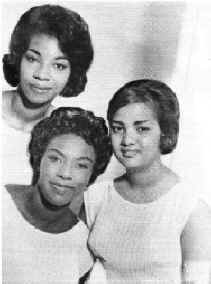
Clockwise from top - Lezli Washington, Yvonne Bushnell,
Ethel Davis
The Jaynetts, from The Bronx, NY, recorded one of the more
discussed recordings of all time, the mystical-sounding
"Sally Go Round the Roses," which shot to number two on
the pop charts in 1963.
Members: (1961- 64)
Ethel Davis
Louis Harris
Selena Healy
Marie Hood
Adie Ray Kelly
Marlina Mars
Lezli Valentine
Mary Green Wilson
Iggy Wilson
|
(1964-66)
Evangeline Jenkins
Linda Jenkins
Georgette Malone
Johnnie Louise Richardson
Dianne Pratt
|
|
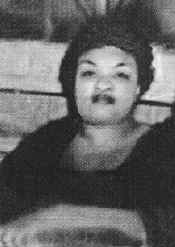
Zell Sanders
The Jaynetts were a female R&B group from the
Bronx formed by producer/composer J & S Records label owner
Zelma "Zell" Sanders The Jaynetts were really more a
studio concoction than a group. In fact, the three women in the
usual Jaynetts publicity photo may not even be the Jaynetts that
recorded the song. There were at least five female vocalists on
the date the song was recorded-- Johnnie Louise Richardson, Ethel
Davis, Mary Sue Wells, Yvonne Bushnell, and Ada Ray.
"Zell wanted another Girl group in
addition to The Hearts because the "on leave" ladies
were returning and she didn't want anyone stranded. She
said to me, "Leslie, give me a name." I said
"J" for J&S, and Ayetts for my middle name, Anetta.
I had no idea she would use it. I had given Zell the name several
years. "Jaynetts" several years prior to her releasing
"Sally".
Lezli Valentine
Sanders who had recorded the Hearts as a group
and was looking to form a second group to absorb some of the
Hearts' overflow members. Thus, some of the Hearts became to be
Jaynetts after the Jaynetts name went unused for five years.
Johnnie Louise Richardson and Joe Rivers
Sanders who was living in the Bronx in 1963, was
producing Rita Zell and Clarence Ashe as well as managing
Johnnie and Joe, Johnnie was her daughter. She had a few short
lived labels, Scatt Dice, and Argyle. She had the Hearts but the
group had splintered.
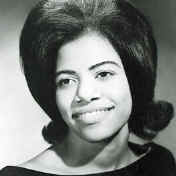
Justine "Baby" Washington
The first Jaynetts single under the group's name
was "I Want To Be Free" in 1958 was actually from Baby
Washington and the Hearts 1957
Sanders used the Jaynetts to put out two
unreleased songs by the Hearts from 1957. The record, "I
Want To Be Free/Where Are You Tonight" was released on
J&S as the Jaynetts putting together a new group of Hearts in
1958. The name wouldn't be used again for five years.
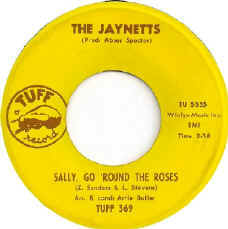
J&S Records had its first
national success in 1961 with The Corsairs' hit "Smoky
Places" which reached #12 in March 1962. In 1963 Spector had
Zell Sanders assemble the line-up to cut a girl group record, and
Spector's wife Lona Stevens wrote "Sally Go 'Round the
Roses" with Sanders for this purpose. Spector spent
about a week creating "Sally Go Round the Roses". The
record was based on the nursery rhyme "Sally Go 'Round The
Roses. The mystifying lyrical ambiguity of "Sally"
would culminate in the creation of a rock and roll classic. The
record reached #6 in New York in the fall of 1963, as well
as #2 on tne Billboard Top 100 September 28, 1963.
The credited members of the
Jaynetts who recorded "Sally Go 'Round the Roses" were
Yvonne Bushnell, Ethel Davis (aka Vernell Hill), Ada Ray Kelly
and Johnnie Louise Richardson. Vocalist who also sang
but uncredited were Selena Healey, Marie Hood, Marlene Mack (aka
Marlina Mack/Marlina Mars), Louise (Harris) Murray, Lezli
Valentine and Iggy Williams.
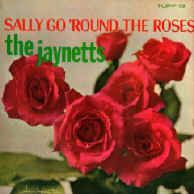
The single's success led to the
release of a Sally Go 'Round the Roses album on Tuff; besides the
title cut, in both the vocal and instrumental versions, and the
follow-up single "Keep an Eye on Her" "bubbled
under the Hot 100" in November 1963. The album featured
"Archie's Melody", "Bongo Bobby", "I
Wanna Know", "No Love At All", "One Track
Mind", "Pick Up My Marbles", "School
Days" and "See Saw"; also featured as "A
Special Guest Appearance" was "Dear Abby" credited
to the Hearts, a minor hit (#94) recorded by at least some of the
same personnel as "Sally Go 'Round the Roses", and with
the same "Sing Along without the..." instrumental-only
version on the B-side. Despite the Jaynetts having been promoted
as a quintet, their album cover image was of a trio, only two of
whom—Ethel Davis and Lezli Valentine—are identifiable.
Lezli is the lead voice on "Sally" and she performed
the spoken part on "Dear Abby".
All female group singles on Tuff were recorded by
a group of women taking turns in the studio, with three as the
tour group. The core was Lezli Valentine, Louis Harris and
Marie Hood. Fill-ins come from among other women in the group
Disgusted with her acts and the lack of
attention her records were getting Zell moved her operation to
upstate Taryton, New York in 1965. She produced Johnnie
Louise and a the Jaynetts with a group from Tarrytown,
Linda Jenkins, Evagiline Jenkins, Dianne Pratt and Georgette
Malone.
Follow up singles on Tuff, "Keep An Eye On
Her," "Snowman, Snowman," and Sweet Potato
Pie" failed to chart and Chess and Specor lost interest.
Zell moved her J&S Records to upstate New York in 1965 and
releases five more singles by the Jaynetts featuring her daughter
Johnnie Richardson.
"What happened was that Abner Spector was
an electronics nut. He took the girls in the studio on a Friday,
and they didn't get out of there until everybody was on the
track. Anybody that came in the studio that week, he would put
them on. Originally, I think he had about 20 voices on
'Sally.'" The cost of the project alone, Richardson figured
was over $60,000 - an unheard of amount of money to spend on
recording a pop single in 1961.
Johnnie Richardson
After her time with The Jaynetts, Lezli Valentine
went into the ministry. Marie Hood moved to the Midwest and
went to work for the United States Post Office. Marlina Mars
became Marlina Mack. Louise Murray married, settled in Manhattan
and raised a family.
Failing health would cause Sanders to leave
the business. She moved to Albany, New York. She passed away in
St. Barnabus Hospital 1n 1976.
Sally, Go 'Round The Roses was reprised by Grace
Slick & the Great Society just prior to her joining the
Jefferson Airplane.
Zelma Sanders passsed away in St. Barnabus
Hospital in New York in 1976.
Johnnie Louise Richardson suffered a stroke and died on October
25, 1988, she was 49.
Lezli Valentine died on March 9, 2021.
Sally Go Round the Roses
Sally go 'round the roses. (Sally go 'round the
roses.)
Sally go 'round the roses. (Sally go 'round the pretty roses.)
The roses, they can't hurt you. (No, the roses, they can't hurt
you.)
The roses, they can't hurt you. (No, the roses, they can't hurt
you.)
Sally don't cha go, don't cha go downtown.
Sally don't cha go, don't cha go downtown.
The saddest thing in the whole wide world is
To see your baby with another girl.
Sally go 'round the roses. (Sally go 'round the roses.)
Sally go 'round the roses. (Sally go 'round the pretty roses.)
They won't tell your secrets. (They won't tell your secrets.)
They won't tell your secrets. (No, the roses won't tell your
secrets.)
Sally, baby, cry, let your hair hang down.
Sally, baby, cry, let your hair hang down.
Sit and cry where the roses grow, you can sit and cry, not a soul
will know.
What about the songs cryptic
interpretation?
"Sally, Go Round the Roses" is a
timeless wonder of a song featuring an odd hypnotic rhythm and
soft voices seductively rising and falling. The lyrics seem to
potray Sally in an alluring bed of roses, catching an eyeful of
her lover with another.
Another interpretation of this song is Sally a
"closeted" lesbian who sees her "baby" also
female with "another girl" which is the "saddest
thing in the whole wide world" except perhaps being a
lesbian in 1963. The roses "won't tell her secret" Of
course her "secret" is her homosexuality and she has no
one to confess it to, but the roses where she "can sit and
cry, not a soul will know."
"Sally Go Round the Roses" very poignantly describes
the way lesbians must have felt back in the early 60's when must
of them felt that they had to hide their sexual orientation.
Another interoperation is the following. "Baby" to
refer to a guy was typical of lots of girl-group recordings (e.g.
"Be My Baby"). Sally had just lost her virginity to the
guy and now he's with another girl.
Others think the song is about a religious experience, or
possibly a mental breakdown.
It has been said "Sally, Go Round the Roses" was
derived from English folk music. Others say it it was Black jump
rope or jacks playing rhyme.
Information on this page taken from a discussion from
rec.music.rock-pop-r+b.1960s






